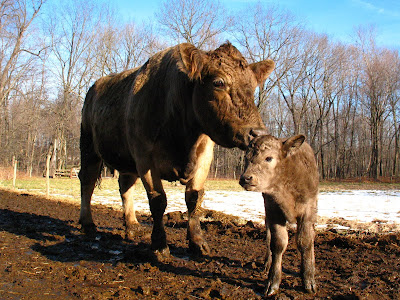January 24, 2010
it's a boy!
This sweet boy kicks off the 2010 calving season. The brood cows (mamas) will have their calves between now and March, most will come in February. The mama usually does all the work on her own. On some occasions the calf may be turned around in the womb or there may be some other labor complications which would require human intervention. Farmer R chooses his brood cows carefully and if they are good mothers and easy 'birthers', he keeps them. Some of his brood cows are over 20 years old and have given him a calf every year.
Since it was so cold and the little one was still wet, Farmer R dried his ears off with a hairdryer so they wouldn't freeze - while mama supervises. She's not so keen to let anyone near her new baby but she knows and trusts Farmer R and realizes he's trying to help. He also puts iodine on the umbilicus (or belly button). After that we left mom and baby alone for a while so that they could bond and begin nursing. The calf will begin to nurse anywhere from 10 minutes to 6 hours after birth. Here's something fascinating... the calf is up and walking around just minutes after birth and as soon as the calf is born, the mama cow checks its gender and licks it's genitals (in the back for females and under the belly for males) to stimulate the first urination. She then licks it's behind which stimulates defecation.
When we came back just a few hours later to check on them. The calf had dried completely and had a nice full belly of mama's milk.
You might wonder why in the world Farmer R would want to have his calves born in the middle of winter. I mean, the timing is essentially up to him since he's the one who puts the bull in with the cows for breeding. I was wondering the very same thing and as I have read lots of theories on this, his reasons never occurred to me. First of all, Farmer R wants to be able to spend lots of time checking in on the mama and baby and if it was born during the summer months, the rest of the farm work keeps him way too busy for that. The second reason is that he raises his cattle strictly on grass. During the winter months he feeds hay that he's grown during the summer. He wants to finish the beef on fresh green grass so if you do the math, this requires them to be born in the winter. The cows usually give birth inside the barn which has deep packed manure mixed with straw. Each morning we sprinkle compost starter and add fresh, clean straw. The composting bedding provides heat which creates a nice cozy environment for the calves. Plus, they're a little more equipped for cold weather than we are with their fur coats.
Another brood cow sniffs and helps clean the new arrival who has wondered outside of the barn. You know, they say it takes a village...
Subscribe to:
Post Comments (Atom)




No comments:
Post a Comment